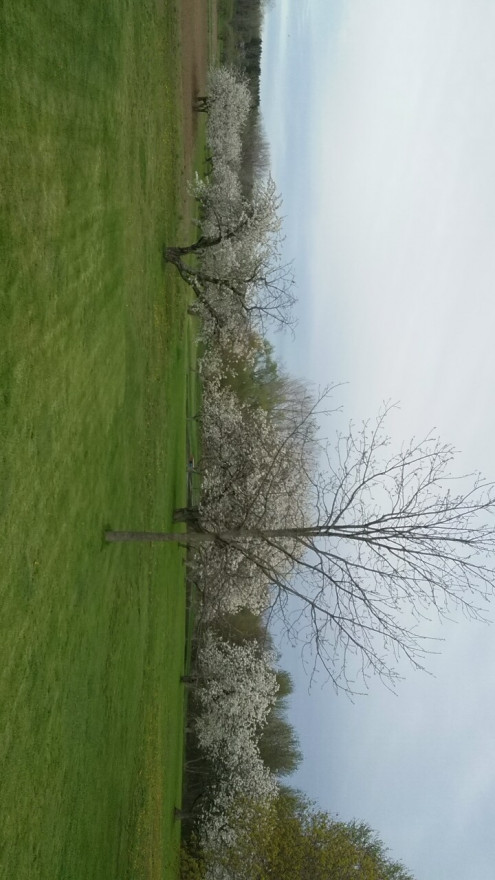
The cherry orchard the author grew up on in Niagara County, N.Y. (Caleb Seib/SUNY-ESF)

The cherry orchard the author grew up on in Niagara County, N.Y. (Caleb Seib/SUNY-ESF)
A rural orchard in upstate New York. There are cherries, apples, and pears. Geese honk in the calm, blue pond. Cars stop to buy fruit from the roadside stand.
As a child, this was my space. The orchards were my playground. I would spend afternoons with my great grandma at the fruit stand. We would count the cars by color as they passed by. I grew up in a house situated between my grandfather and my great-grandparents. They built the orchards I found refuge in and cultivated the land I called home.
Place attachment is fundamental to developing environmental attitudes. Connection to place is the emotional connection an individual feels toward their surroundings. This is often developed through childhood interactions and life experiences. The deeper the place attachment, the more likely a person is to be concerned about their local environments.
It can be easy to imagine place connections in rural areas where you are “closer” to nature. But not everyone grew up on an orchard (like me), in the woods, or on a farm. Everyone experiences place connections in different ways regardless of where they live.
Even though cities may seem vastly different from the countryside, there are some key similarities in how we relate to our surroundings. Our inherent affinity toward the natural world can extend beyond cultural reservations. Though many may be hesitant at first, good environmental education programs and citizen science initiatives can help people feel connected to their natural communities no matter where they are. A better understanding of local ecology will give people the confidence to stand up for environmental protection in their communities.
Currently, most citizen science programs are directed at studies of local ecology. These are beneficial on their own, but they also create possibilities for new types of engagement. We can adapt citizen science to environmental justice projects. Programs that teach people how environmental issues personally affect their communities can help people get a broader understanding of the importance of these issues in their neighborhoods and can help them make connections with other people who want to make their community a safer, healthier, and more enjoyable place to live. If we nurture our place connections and learn how they relate to our local ecologies and environmental issues, we can all become powerful advocates for the environment.
Once we understand our own connections, we can connect with our neighbors. The people we live near often have a similar sense of attachment to place. We often share many of the same values and concerns regarding our local environments. Personal actions to save the environment are great. Reducing our own carbon footprint with eco-friendly methods is a good practice to keep, but we know it will not end climate change. Additionally, governments change rapidly and bend to the whim of money and politics. They have consistently proven themselves unwilling to meet the demands of climate change mitigation.
So, what can we do? We can heal our environment through community efforts. Collective place attachment and community empowerment can uplift people to take direct action in helping their local environments. Citizen science initiatives can be used to increase place attachment and build community efforts. A system of community-lead organizations to support local environments that interact with and learn from one another can develop a grassroots initiative uniquely tailored to regions with a disregard for political borders. We have the potential to create a global matrix of communities working to protect the environment.